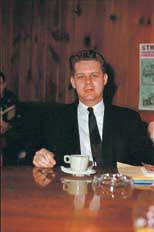
Paul C. McKinney will be revered by students, faculty and friends of the College who have had the pleasure of working with him. Intellectual curiosity, common sense and civility are hallmarks of this man.

Professor McKinney, 1961
Magazine
Summer/Fall 2001
A Tribute from the Wabash Faculty:
Paul Caylor McKinney
Paul Caylor McKinney, the oracle of Otterbein, graduated from Wabash with the class of 1952. Four years later, after graduate study at Northwestern University and a year as a Fulbright scholar at Albert-Ludwigs University in Freiburg, Germany, Paul joined the faculty of the chemistry department that included among others, Lloyd "Doc" Howell and Ed Haenisch. Beginning his academic career as an instructor, he rose thorough the ranks to become a full professor in 1977.
Few have served Wabash in so many different ways and with such distinction as Paul. He has been the Chair of the Chemistry Department, the Chair of the Division of Science and Mathematics and, of course, Dean of the College.
Paul had excellent role models since he has known every Dean since George V. Kendall, which is to say he was not personally acquainted with the first three Deans of the College. It is reported that Dean Kendall is the only person to ever call Paul, "Mac."
During Paul's tenure as Dean, close to one hundred new teachers joined the faculty and twenty members of the current faculty were granted tenure. A number of significant programs also were started under Paul's watch in the Dean's Office. The Multicultural Scholarship program, the Fine Arts Fellows program, the Full Tuition International Student Awards and the Byron K. Trippet Assistant Professorships are just a few that owe their existence to Paul's creative efforts and perseverance. Faculty development also was a major priority for Paul while he was Dean.
He was once asked what aspect of being Dean was the most fun for him and he answered, "Making things possible for people, helping people have time to write and develop."
Support of scientific research has always been high on Paul's agenda. While he is considered a theoretical chemist, his understanding of the importance of state-of-the-art equipment to a first rate undergraduate science program led, in the early 1970's, to a major National Science Foundation grant to Wabash. Paul was the principal author of that successful proposal. In the late 1980's, Paul again played a huge role in the development and implementation of the Pew Charitable Trust grant to the science division that funded a number of collaborative projects with other colleges and universities including summer research opportunities for undergraduates. His support also was an important aspect of the Howard Hughes Medical Institute grant to biology and chemistry at about the same time.
Besides the usual deanly duties that included personnel decisions, faculty development and departmental reviews, Paul regularly taught introductory mathematics, freshman tutorials as well as Cultures and Traditions. While he is now officially retiring, he will serve as co-leader of the C&T course during the 2001-2002 academic year. Since returning to full-time teaching, Paul has been at the forefront of the campus critical thinking in writing program.
As a chemistry teacher, Paul could teach t he most difficult and important concepts in ways that would challenge the very best senior majors and enlighten the beginning student as well. In 1997 Paul received the McLain/McTurnan/ Arnold award for excellence in teaching.Paul has been described by students and colleagues as a Renaissance man and as the personification of the Liberal Arts. These monikers fit Paul very well.
A world traveler and speaker of several foreign languages, Paul has long recognized the value of studying other cultures. In his early years at the College it was not uncommon to see Paul performing in Scarlet Masque theater productions. Although his appearances on the boards have waned in recent years, his penchant for the theatrical is no less intense as all of us who heard his Senior Breakfast presentations can testify. His speeches, now legendary, not only provided the seniors with excellent advice, but they also were done with the energy and flair that would warm the heart of any director. Some may not appreciate the fact that Paul also is a talented pianist who, by his own admission, does not practice enough.
Dean Emeritus McKinney also has served the larger Wabash family as a member of the Board of Directors of the National Association of Wabash Men. Within the Crawfordsville community he has played a significant role as the leader of the county Democrat Party and was, in fact, a candidate for the state legislature. In the early 1970's, Paul was much involved with community efforts to address important environmental issues. He also was director of the Montgomery County United Fund drive and served the Youth Service Bureau. In his forty-five years of service to Wabash, Paul has been a mentor to many students and faculty alike. He is the epitome of a colleague.
After President Salter died, Paul vowed to finish the ongoing scholarly work that Lew left behind. Paul did indeed complete this work. Paul C. McKinney, will be revered by students, faculty and friends of the College who have had the pleasure of working with him. Intellectual curiosity, common sense and civility are hallmarks of this man.
Mr. President, in recognition of his long service (only John Lyle Campbell was a member of the faculty longer than Paul) and outstanding contributions to Wabash College as a teacher, advisor, colleague and alumnus, and also because he truly has judged thoughtfully, acted effectively and lived humanely making our College a better place, I move that the faculty express its deepest appreciation to Paul Caylor McKinney for being "some Little Giant" and wish him the very best in his retirement.
Austin Brooks
May 11, 2001
Return to the table of contents
